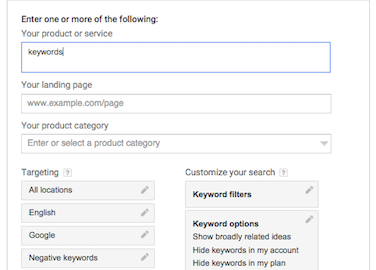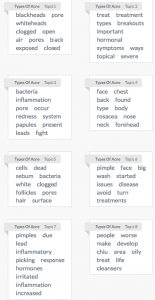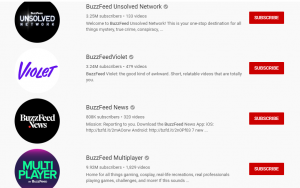
“A keyword is not a keyword until you know how to use it!”
That Seussonian declaration was how digital marketer Cijaye DePradine launched her presentation, Keywords to Profit, at WordPress Workshop on January 19th, and it really perked up the 20 or so attendees.
“It doesn’t matter if you have keywords unless you understand what to do with them” she said. “Anything else is like throwing spaghetti at a wall and hoping it sticks.”
DePradine has been in the business of keyword targeting since 1995 and uses her experience to train professionals at the executive and college level. Having turned many client’s businesses around with the turn of a keyphrase, you can say she knows her words.
For bloggers and business owners, she had lots of advice for how to use keywords to profit online.
Determine audience needs

Cijaye DePradine speaks about how to use keywords at WordPress Workshop
“To discover your real audience is your first step. From looking at the audiences and seeing what do you like” DePradine said. “Who do you resonate with? What can you offer those people that will make them buy?”
This take some reverse engineering of your knowledge to determine, she advised. But if, if your message is not working, find a back door to bring in customers.
Repackage what you offer. Reposition the site. Build another site. Ditch your content altogether and deliver what the customer wants.
If you have what customers want, but they are not converting, check your quality and consistency of your message, and post more of it.
Link building is problematic, due to Google algorithm changes. Social media mentions lead to more shares and linking.
Leveraging paid advertising is a great way to validate your audience and your efforts.
If you are offering a back door product, create content that is related to in-demand markets and create a need for your product.
Leverage affiliate marketing to promote other products that are related.
Use intention-based search terms as long tail keywords. Avoid ambiguity of short phrases. Use long phrases with focused intention.
Find your keywords/keyphrases

Google Suggests tool
Singular words don’t work. Use phrases that are more granular. And, longtail keyword phrases.
Brainstorm what you think your audience wants, needs, and uses. Think like your audience. Make a list of what you know. Ask around for suggestions.
Use the Google Suggests tool to autofill your ideas with keywords being searched, adding one letter at a time.
Then, check Google’s “Searches Related to” suggestions at the bottom of the SERP page to get more key phrases.
Related Terms might send you down a “rabbit hole” where you might discover other ideas to use.

Google Trends tool
Let your competition give you keyword ideas. Note their emphasized words, colors, formatting that stands out as important. View the source file to find their titles, categories, and tag structures, and monitor the keywords that come up .
Install the free SEO Quake tool in your browser to view the competition’s intentional keywords.
Check Google Trends to find out what keywords are trending and what news is driving the searches.
Adjust results by adding quotes around searches that are on the rise.
Filter your Google Trends search results. Try different combinations and figure out what works for you.
Validate Keyword Search Research

Keyword Planner tool
Use Google Keyword Planner, which is free when you are signed into Google. Be sure to click the link I Am An Advanced User to avoid setting up an Adwords campaign.
Enter the keywords and keyphrases you brainstormed.
Enter category keywords for more brainstorming ideas.
Enter websites to get keywords of your competitor’s site.
Keep in mind that the results are based on pay-per-click NOT organic search, which is what you want.
Play with filters, but remember the filter sticks, and if you change your search, undo the filters.
Filter Broad, (word combinations) Exact, or Match (in precisely the order requested.)
Consult SEO tools
DePradine uses a number of online tools to discover and validate keywords. Here are a few:
Use keywords on page
DePradine emphasized more posting to get more conversions. “The more frequently you blog, the higher your chances of getting a customer. The less you blog, the less chance you have of making money.”
Every unique keyphrase should be considered the topic of your blog post.
With the help of Yoast SEO, use the keyphrase in your title, header tags, alt tags, links and emphasized text.
Add related keywords, keyword variants, and entity connections (subject, object and predicate) in your header tags, image tags, meta descriptions and inbound links to boost the strength of your keyword phrase.
Be sure your keyword-rich permalinks mirror your post title, which becomes the H1 heading tag. (In WordPress, edit in Settings>Permalinks.)
Other keyword optimization techniques

WordPress header tags
Use header tags in a hierarchy to show structure, not formatting.
Emphasize important text with bold, italics, and colors to stand out to Google.
Add keyword phrases to image alt tags.
Schedule your posts and don’t change the dates of your post more than once!
Make your titles search friendly but be sure they’re sharable to the readers.
Use your name as the author, not “admin”!
Clean out comment spam so Google knows you care.
Avoid duplicate posts. Blank meta descriptions tell Google the post is a duplicate.
Share posts, not just your home page.
Use mixed media such as images, and video, housed in YouTube or Vimeo, but be sure to include entry text and exit text around the video.
Put your posts in a structure that can be extracted and repurposed as an ebook that can be sold or used as a sign-up gift. Find keyword sets, sequence information, write posts, package as ebook, sell.
Use each post/chapter as a module in a training course to sell.
Create an editorial calendar that charts date, day, original/curation, source, title, description, primary keyword, secondary keyword, purpose/CTA, URL, images, video, affiliate, Facebook, twitter, Yoast.
Embellish your posts by spinning them into press releases, infographics, quotable images, slide decks, explainer videos, podcasts, checklists, ebooks, trainings, templates, workbooks, bundles, memberships, 1-1 coaching and workshops.
Keyword powered
By the end of the Meetup, Cijaye was so bombarded with questions she could barely finish her beer. WordPress Workshop members were positively energized by all the concepts she’d presented and were eager to get advice about their own keyword usage.
Digital & Social Articles on Business 2 Community(78)
Report Post






